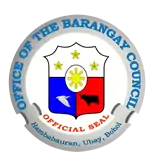Hambabauran
Hambabauran is one of the 44 barangays of the municipality of Ubay, in the province of Bohol, Philippines.
Hambabauran | |
|---|---|
 Seal | |
| Coordinates: 10°00′05″N 124°24′50″E | |
| Country | Philippines |
| Region | Central Visayas Region VII |
| Province | Bohol |
| District | 2nd District of Bohol |
| Municipality | Ubay |
| Urban District | III |
| Established | 2 August 1968 |
| Purok | 7 |
| Government | |
| • Type | Sangguniang Barangay |
| • Barangay Captain | Policarpo Vasquez |
| • Brgy Council | |
| Area | |
| • Total | 521 ha (1,287 acres) |
| Population | |
| • Total | 1,205 |
| • Density | 230/km2 (600/sq mi) |
| • Voter (2013)[2] | 666 |
| Time zone | UTC+8 (PST) |
| ZIP code | 6315 |
| IDD : area code | +63 (0)38 |
| PSGC | 071246022 |
The barangay's total land area is 521 hectares (1,290 acres).[3] According to the 2015 census, it has a population of 1,205. [1]
Hambabauran celebrates its annual fiesta on 15 January in honor of their patron saint.
Location
Located in the west of the municipality, Hambabauran is bounded to the north by Camali‑an and Pag‑asa, to the east by Lomangog, to the south by Gabi, and to the west by the municipality of San Miguel. Hambabauran is 12 km (7.5 mi) from the town center, Poblacion.
Government
There are seven puroks overseen by the elected kagawads including the Punong Barangay or Barangay chairman.
Economy
People in the barangay are mostly farmers who live by planting rice, camote, cassava, banana, and other vegetables. Some till agricultural small-holdings. Some of population also weave mats, and produce palm oil and coconut products.
Facilities and Services
- Barangay Hall
- Barangay Health Center
- Day Care Center
- Elementary School
- High School
- Multi-purpose pavement
- SK Office
- Tanod Outpost
- 7 Purok Kiosks
References
- Census of Population (2015). "Region VII (Central Visayas)". Total Population by Province, City, Municipality and Barangay. PSA. Retrieved 20 June 2016.
- 2013 Barangay and Sangguniang Kabataan Election
- Saz, Efren B. (April 2007). "A Comprehensive Assessment of the Agricultural Extension System in the Philippines: Case Study of LGU Extension in Ubay, Bohol" (PDF). Philippine Institute for Development Studies. Retrieved March 14, 2015.

